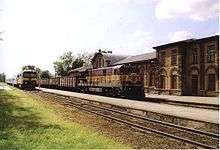GE C30-7
The C30-7 is a 6-axle road switcher diesel-electric locomotive built by GE Transportation Systems between 1976 and 1986 as an updated U30C with a 16-cylinder 3,000 horsepower (2,200 kW) FDL-series diesel engine. 1,137 were built for North American railroads.
| GE C30-7 | |||||||||||||||
|---|---|---|---|---|---|---|---|---|---|---|---|---|---|---|---|
_at_Granger%2C_WY_in_December_1984_(27291009492).jpg) UP 2482 at Granger, Wyoming in 1984 | |||||||||||||||
| |||||||||||||||
| |||||||||||||||
| |||||||||||||||
| |||||||||||||||
Variants
C30-7A
A variant of the C30-7, 50 GE C30-7As were purchased by Conrail in mid-1984. Externally similar to the GE C30-7 model, six tall hood doors per side (in place of eight) showed it had a 12-cylinder (rather than 16-cylinder) prime mover. Both engines produced 3,000 horsepower (2,200 kW) but the C30-7A's smaller engine used less fuel. The C30-7A units were built between May and June 1984.
Chicago Freight Car Leasing Australia purchased twelve former Conrail C30-7A locomotives in 2001 and used their traction components in the rebuilding of 442 class locomotives as the GL class. These entered service in Australia from 2003.[1]
In December 2018, Brazil’s only surviving C30-7A was restored in time for use on a holiday train.
Original owners
| Railroad | Quantity | Road numbers | Notes |
|---|---|---|---|
| Atchison, Topeka and Santa Fe Railway | 157 | 8010-8166 | Remaining units went to BNSF after the BN-ATSF merger in 1996. Most were returned to GE prior to merger and subsequently acquired by Conrail, Helm Leasing, and Union Pacific. All sold in the late 1990s to early 2000s. Many have found their way to the ALL (America Latina Logistica) Railroad in Brazil. |
| Burlington Northern Railroad | 242 | 5000-5141, 5500-5599 | Remaining units went to BNSF after the BN-ATSF merger in 1996. All sold in the late 1990s to early 2000s. Many have found their way to the ALL (America Latina Logistica) Railroad in Brazil. |
| Conrail | 60 | 6550-6609 | 6550-6599 were model C30-7A. 12 exported to Australia and later rebuilt into NSW 442 Class locomotives. Others exported to Estonia and rebuilt for use on Eesti Raudtee. |
| Ferrocarril del Pacífico | 26 | 434-459 | |
| Louisville and Nashville Railroad | 44 | 7000-7015, 7032-7051, 7062-7069 | Delivered in Family Lines paint |
| Ferrocarriles Nacionales de México | 305 | 6700-6799, 9600-9656, 11001-11148 | 11040-11090, 11129-11148 built from kits in Mexico |
| Norfolk and Western Railway | 80 | 8003-8082 | |
| Seaboard Coast Line Railroad | 51 | 7016-7031, 7052-7061, 7070-7094 | Delivered in Family Lines paint |
| Union Pacific Railroad | 140 | 2415–2539, 2960–2974 | |
Use in Estonia

In 2003 19 C30-7As were rebuilt and exported to Estonia as C30-7Ais to be used by EVR (Eesti Raudtee) which at that time was privately owned. The locos were numbered as part of Class 1500 (1558–1576) and were second-hand from Conrail/CSX/NS (USA).
In 2018, Operail (formerly EVR Cargo) announced it had completed its first conversion of the series with #1564. International Railway Journal reported, "Only the frames and bogies of the original locomotive were retained and the C30-M features a new centrally-positioned driver’s cab and a 1.55MW Caterpillar 3512C HD diesel engine." The converted unit has a 1520mm track gauge and weighs 138 tonnes. Operail's redesign makes the units suitable for shunting and line haul. The redesigned units are planned for internal use and export sales.[2]
| EVR | Conrail | CSX | NS |
|---|---|---|---|
| 1558 | 6552 | n# | 8084 |
| 1559 | 6580 | n# | 8098 |
| 1560 | 6582 | n# | 8099 |
| 1561 | 6597 | n# | 8109 |
| 1562 | 6598 | n# | 8110 |
| 1563 | 6553 | 7096 | 8113 |
| 1564 | 6565 | 7100 | 8117 |
| 1565 | 6561 | n# | 8090 |
| 1566 | 6577 | 7107 | 8124 |
| 1567 | 6596 | n# | 8108 |
| 1568 | 6586 | 7112 | 8129 |
| 1569 | 6591 | n# | 8104 |
| 1570 | 6581 | 7110 | 8127 |
| 1571 | 6592 | n# | 8105 |
| 1572 | 6572 | 7103 | 8120 |
| 1573 | 6571 | 7102 | 8119 |
| 1574 | 6579 | 7109 | 8126 |
| 1575 | 6584 | n# | 8100 |
| 1576 | 6599 | n# | 8111 |
See also
- Iranian locomotives
References
- Oberg, Leon (1962). Locomotives of Australia. Rosenberg Publishing. p. 367. ISBN 978-1-877058-54-7.
- "Estonia's Operail rebuilds US diesel locomotives". International Railway Journal. October 19, 2018. Retrieved October 23, 2018.
- "(untitled)". Archived from the original on February 24, 2008.
- Extra 2200 South. Missing or empty
|title=(help)
External links
